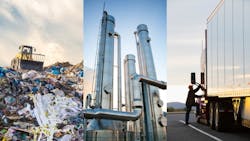RNG producer Archaea Energy being acquired by oil giant bp for approximately $4.1B
Oil and gas giant bp (historically known as British Petroleum) has added another piece in its moves toward renewable fuels and zero-carbon outcomes.
The company is acquiring renewable natural gas (RNG) producer Archaea Energy Inc. The transaction, once approved by regulators and Archaea shareholders, is valued at close to $3.3 billion in cash and $800 million in debt.
Archaea develops and produces RNG from landfills and other waste products. Bioenergy is one of five strategies that bp wants to pursue for future growth.
“Archaea is a fantastic fast-growing business, and bp will add distinctive value through our trading business and customer reach,” bp CEO Bernard Looney said in a statement. “It will accelerate our key bioenergy growth engine, creating a real leader in the biogas sector, and support our Net Zero ambition.”
Earlier this month, EnergyTech reported on Archaea Energy agreeing to a joint venture with waste disposal firm Republic Services to develop an RNG facility at Republic’s Middle Point Landfill in Murfreesboro, Tennessee.
The Archaea-Republic joint venture will be called Lightning Renewables. The Middle Point project is part of a first phase of 39 RNG deals planned at landfills owned or operated by Republic.
Gas generator-microgrid firm Enchanted Rock also is developing RNG projects, including an agreement with tech giant Microsoft to produce the biofuel for a data center.
Houston-based Archaea operates 50 RNG and landfill gas-to-energy facilities across the U.S. These facilities produce about 6,000 barrels of oil equivalent in RNG per day, according to the company. The waste removed from landfills otherwise would emit vast amounts of methane gas, considered by environmental scientists as more harmful as a greenhouse gas than even carbon dioxide.
A British multinational oil exploration and production firm with thousands of interests in drilling globally, bp publicly has vowed to focus on dramatically lowering its carbon footprint in coming decades. Among those decarbonization moves include investments in electric vehicle charging, hydrogen and carbon capture projects.
-- -- --
(Rod Walton, senior editor for EnergyTech, is a 14-year veteran of covering the energy industry both as a newspaper and trade journalist. He can be reached at [email protected]).
Follow us on Twitter @EnergyTechNews_ and @rodwaltonelp and on LinkedIn
About the Author
Rod Walton, EnergyTech Managing Editor
Managing Editor
For EnergyTech editorial inquiries, please contact Managing Editor Rod Walton at [email protected].
Rod Walton has spent 17 years covering the energy industry as a newspaper and trade journalist. He formerly was energy writer and business editor at the Tulsa World. Later, he spent six years covering the electricity power sector for Pennwell and Clarion Events. He joined Endeavor and EnergyTech in November 2021.
Walton earned his Bachelors degree in journalism from the University of Oklahoma. His career stops include the Moore American, Bartlesville Examiner-Enterprise, Wagoner Tribune and Tulsa World.
EnergyTech is focused on the mission critical and large-scale energy users and their sustainability and resiliency goals. These include the commercial and industrial sectors, as well as the military, universities, data centers and microgrids. The C&I sectors together account for close to 30 percent of greenhouse gas emissions in the U.S.
He was named Managing Editor for Microgrid Knowledge and EnergyTech starting July 1, 2023
Many large-scale energy users such as Fortune 500 companies, and mission-critical users such as military bases, universities, healthcare facilities, public safety and data centers, shifting their energy priorities to reach net-zero carbon goals within the coming decades. These include plans for renewable energy power purchase agreements, but also on-site resiliency projects such as microgrids, combined heat and power, rooftop solar, energy storage, digitalization and building efficiency upgrades.

